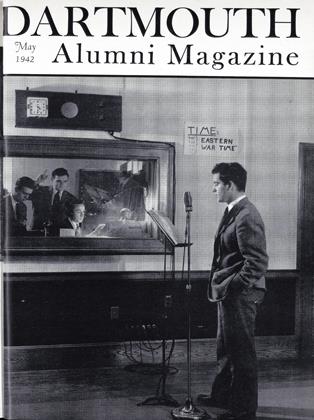THIS, I believe, will be my swan song until fall. As is usually the case what seems timely as I write this will not be so timely when this article appears. However, a book worth mentioning should live at least six weeks so here goes.
One book which may well survive the WAR is Saint-Exupery's Flight to Arras, which has been described as his "recollection in tranquility," to borrow a phrase from Wordsworth, of those final shattering days of May, 1940, when, because defeat had been made certain by the betrayal of France by the haves (and not by the have nots) and although the will to fight was weak throughout all France, the fliers of France, a mere handful, fought on. This book describes a single evening's actiona photography sortie carried out at 33,000 feet (4,000 feet higher than Everest) in defiance of the gigantic German Luftwaffe, and later by an observation flight at 2,000 feet over the German tank park encircling burning Arras, within easy range of German anti-aircraft fire.
"Why in the midst of defeat, do I and my kind continue to take the risk of death?" Saint-Exupery asks himself, and his answer approximates a universal one. The average reader may find the action congealed a bit by the author's penchant for philosophical speculations. The translation is excellent as are the illustrations.
And with this book may be read John Steinbeck's moving story The Moon isDown. This is a short novel, or a play written in novel form, about a small nation (Norway) conquered by a large nation (Germany). His thesis is that a free people is unconquerable. This remains to be seen but I hope Mr. Steinbeck is right.
A book which recalled old army days for me and will recall present army days for many of you, has been written by Colonel Elbridge Colby, and published by the Princeton University Press at the small price of $2, and called Army Talk. This book explains the language used by United States soldiers, and the curious reader may here find the meaning and derivation of such words, along with hundreds of others, as eyewash, jawbone, jeep, Mae Wests, walkie talkie, slum burner, dog robber, bunk flying, hit the silk, caisson, colonel's wife's silk stocking, jughead, A.W.0.L., and zombie. The book is appropriately enough dedicated to Henry L. Mencken.
Sid Hayward loaned me, with evident enthusiasm for the book, Louis Adamic's Two-Way Passage which has stimulated a good deal of controversy. (Harper & Brothers published it). In spite of its appeal I suspect that Mr. Adamic's plan is too sink pie, and perhaps over naive. He attempts to suggest how we can defeat the anti-democratic forces that threaten the world's future. "We all came from somewhere; from many lands. That was the Passage Here. Now we've got to go back. This is the Passage Back. We've got to take to Europe our American revolution, our accumulated American experience." It was Owen Lattimore who lecturing here recently intimated that Asia, at least, and in particular China, has just as much to bring to us as we have to bring to them. This is something, possibly, that we might remember about Europe as well. Curiously enough this something might conceivably be democracy.
ADVENTURE YARN
Karl Baarslag in his recent Islands of Adventure tells of strange and exotic islands scattered all over the globe: Easter, isle of mystery and fear, that trembles with the force of the pounding breakers of the Pacific; Cocos, mecca of all treasure seekers (the inspiration for Stevenson's TreasureIsland)-, Mangareva with its amazing, empty white coral cathedral; Pitcairn; Juan Fernandez; the Grand Cayman, west and north of Jamaica; Galapagos; Robinson Crusoe's island, and many others. The story of Albert Pagers, the German who knew all the hidden straits around Tierra del Fuego, and who successfully hid the cruiser Dresden, in December, 1914, after the battle of the Falkland Islands, will keep you wide awake. A delightful book and one hard to put down.
A book which explains, in my opinion, some of the mess we are in today is Gustavus Myers' History of the Great AmericanFortunes. This source book for American history is now available in the Modern Library Giants for only $1.45. None of the facts therein have ever been denied so far as I know, and the author has brought it up to date.
Finally I recommend Edgar M. Queeny's Cheechako, a story of an Alaskan bear hunt (before the WAR), and Charles Allen Smart's Wild Geese and How to ChaseThem, a book on living as an art.
 View Full Issue
View Full Issue
More From This Issue
-
 Article
ArticleDartmouth Broadcasting System
May 1942 By WILLIAM J. MITCHEL JR. -
 Class Notes
Class Notes1917*
May 1942 By EUGENE D. TOWLER, ARTHUR P. MACINTYRE -
 Sports
SportsBig Green Teams
May 1942 By James L. Farley '42 -
 Class Notes
Class Notes1918*
May 1942 By ERNEST H. EARLEY, RICHARD A. HOLTON -
 Article
ArticleWar Program Takes Hold
May 1942 -
 Article
ArticleThe Undergraduate Chair
May 1942 By Edward J. Rasmussen '42
Article
-
 Article
ArticleMasthead
-
 Article
ArticleJames J. Mulligan '42 recently was named
November 1959 -
 Article
ArticleHistorical Novelist's Papers Given
FEBRUARY 1967 -
 Article
ArticleREASONS FOR POLL
December 1949 By Bill Mulligan '50 -
 Article
ArticleDartmouth in Mew York
October 1937 By Milburn McCarty Jr. '35 -
 Article
ArticleClovers Bring Good Luck to Octogenarian
MARCH 1983 By Teri Allbright


